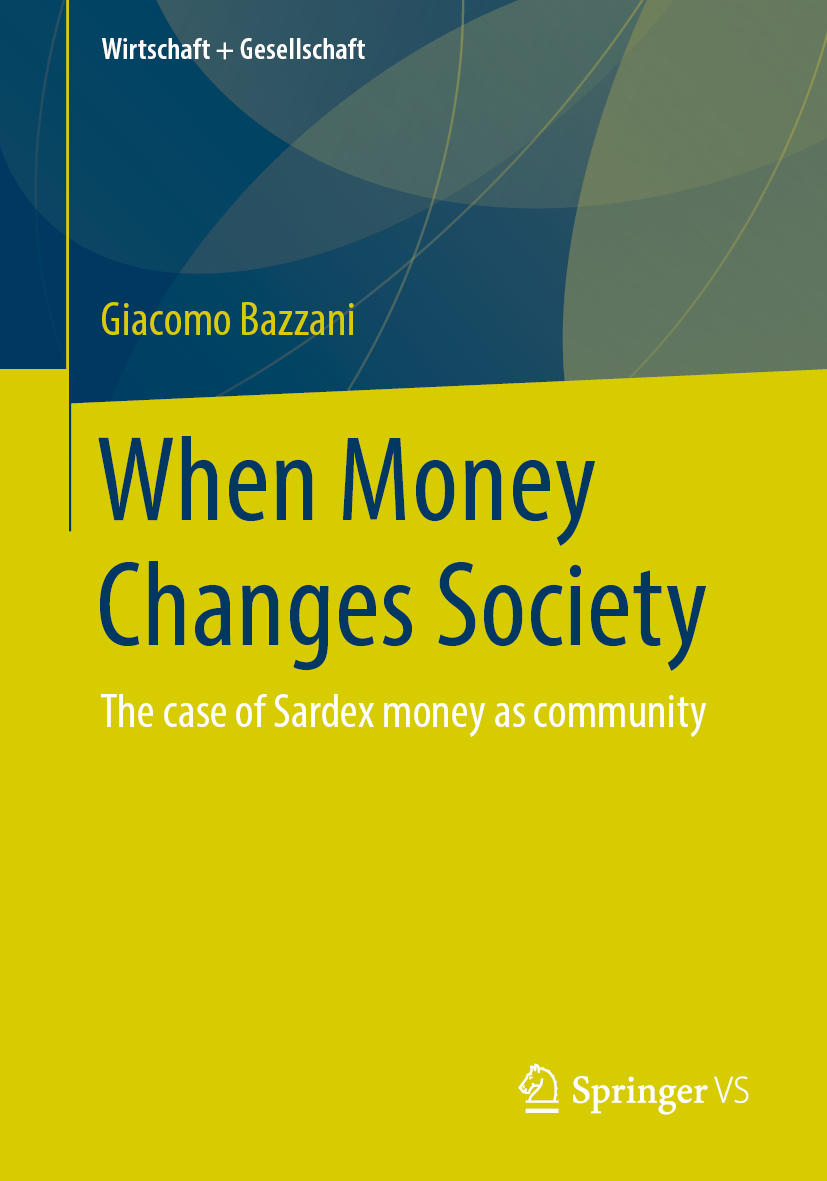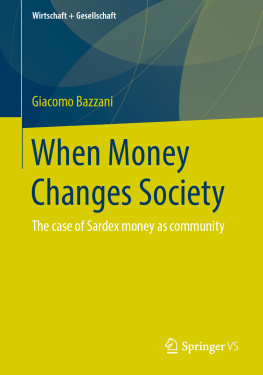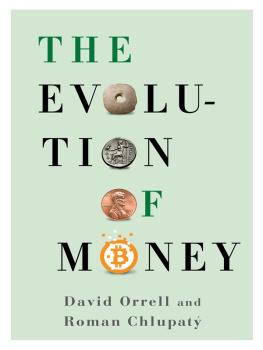Giacomo Bazzani - When Money Changes Society: The case of Sardex money as community
Here you can read online Giacomo Bazzani - When Money Changes Society: The case of Sardex money as community full text of the book (entire story) in english for free. Download pdf and epub, get meaning, cover and reviews about this ebook. year: 2020, publisher: Springer Nature, genre: Politics. Description of the work, (preface) as well as reviews are available. Best literature library LitArk.com created for fans of good reading and offers a wide selection of genres:
Romance novel
Science fiction
Adventure
Detective
Science
History
Home and family
Prose
Art
Politics
Computer
Non-fiction
Religion
Business
Children
Humor
Choose a favorite category and find really read worthwhile books. Enjoy immersion in the world of imagination, feel the emotions of the characters or learn something new for yourself, make an fascinating discovery.
- Book:When Money Changes Society: The case of Sardex money as community
- Author:
- Publisher:Springer Nature
- Genre:
- Year:2020
- Rating:3 / 5
- Favourites:Add to favourites
- Your mark:
- 60
- 1
- 2
- 3
- 4
- 5
When Money Changes Society: The case of Sardex money as community: summary, description and annotation
We offer to read an annotation, description, summary or preface (depends on what the author of the book "When Money Changes Society: The case of Sardex money as community" wrote himself). If you haven't found the necessary information about the book — write in the comments, we will try to find it.
Giacomo Bazzani: author's other books
Who wrote When Money Changes Society: The case of Sardex money as community? Find out the surname, the name of the author of the book and a list of all author's works by series.
When Money Changes Society: The case of Sardex money as community — read online for free the complete book (whole text) full work
Below is the text of the book, divided by pages. System saving the place of the last page read, allows you to conveniently read the book "When Money Changes Society: The case of Sardex money as community" online for free, without having to search again every time where you left off. Put a bookmark, and you can go to the page where you finished reading at any time.
Font size:
Interval:
Bookmark:

Wirtschaft und Gesellschaft ist ein wichtiges Themenfeld der Sozialwissenschaften. Daher diese Buchreihe: Sie will zentrale Institutionen des Wirtschaftslebens wie Mrkte, Geld und Unternehmen sowie deren Entwicklungsdynamiken sozial- und gesellschaftstheoretisch in den Blick nehmen. Damit soll ein sichtbarer Raum fr Arbeiten geschaffen werden, die die Wirtschaft in ihrer gesellschaftlichen Einbettung betrachten oder aber soziale Effekte des Wirtschaftsgeschehens und wirtschaftlichen Denkens analysieren. Die Reihe steht fr einen disziplinren wie theoretischen Pluralismus und pflegt ein offenes Themenspektrum.
More information about this series at http://www.springer.com/series/12587

Planung/Lektorat: Cori Antonia Mackrodt
This Springer VS imprint is published by the registered company Springer Fachmedien Wiesbaden GmbH part of Springer Nature.
The registered company address is: Abraham-Lincoln-Str. 46, 65189 Wiesbaden, Germany
This book is the result of research undertaken in the PhD programme in Social and Political Change at the Universities of Turin and Florence. My supervisor was Prof. Carlo Trigilia who accompanied the research in all its parts with passion, availability and professionalism. The entire PhD programme board has always encouraged and followed all the research with useful tips. In particular, I must thank Prof. Marco Bontempi who provided constant help, support and encouragement at every stage of the research.
Thanks are due to Sardex Ltd, its founders and all the staff whose willingness and availability made this research easier.
The research benefited from a One Year Research Grant (91660080) obtained from the DAAD (German Academic Exchange Service) which made it possible to refine the interpretation of the results during the 2017/2018 academic year while visiting the Max Planck Institute for the Study of Societies in Cologne and the University of Trier. An earlier version of the thesis was discussed at the Max Planck Institute for the Study of Societies in Cologne and benefited from the helpful advice of the Director, Prof. Jens Beckert, Wolfgang Streek, Fritz Scharpf, John Wilkinson, Benjamin Braun, Gregory Ferguson as well as numerous researchers at the institute. An earlier version of the research was also presented at Trier University and it benefited from the useful suggestions of Prof. Andrea Maurers research group, especially Michael Anger and Clemens Schmidt. Special thanks go to Prof. Andrea Maurer for her constant feedback which helped identify the social mechanisms and for her enthusiasm throughout the research.
Parts of the research were also discussed at conferences and seminars at the Panteion University of Social and Political Sciences in Athens, The New School in New York, the University of Constance, the University of Florence, the University of Lyon 1, Universitat Oberta de Catalunya of Barcelona, the University of Helsinki, the University of Oslo, the University of Rome La Sapienza the many comments received were beneficial. I had the opportunity to discuss the research and receive very useful advice from Patrick Aspers, Delia Baldassarri, Filippo Barbera, Jrme Blanc, Maurizio Catino, Dimitri DAndrea, Nigel Dodd, Alberto Gherardini, Giorgio Grossi, Peter Hedstrm, Lars Mjset, Paolo Perulli, Aaron Pitluck, Francesco Ramella, Roberta Ricucci and Akos Rona-Tas. Useful advice also came from the two reviewers who contributed to the final version of the text through two review rounds.
The English language manuscript editing was funded by the Inter-University Centre for Political Sociology of the Universities of Florence, Perugia and Genoa. Jane Ferguson Simpson has done an excellent and accurate job of translating and proof-reading which led to the current version of the text.
This project has taken five years and I would never have been able to carry it out on my own: I wish to thank all my family who accompanied me with trust and generosity during this extraordinary experience.
Founder interview n
E.Entrepreneur interview n
CCComplementary currency
Sardex currencyThe circulating money expressed in Sardex
Sardex LtdThe company which founded, promotes and manages the circulation of Sardex currency
Sardex network or networkThe network of companies using the Sardex currency
Sardex deviceAll the technological and social elements involved in the functioning of the Sardex currency
Sardex projectThe functioning of the Sardex currency and the economic and political form of regulation of the economy embodied
Font size:
Interval:
Bookmark:
Similar books «When Money Changes Society: The case of Sardex money as community»
Look at similar books to When Money Changes Society: The case of Sardex money as community. We have selected literature similar in name and meaning in the hope of providing readers with more options to find new, interesting, not yet read works.
Discussion, reviews of the book When Money Changes Society: The case of Sardex money as community and just readers' own opinions. Leave your comments, write what you think about the work, its meaning or the main characters. Specify what exactly you liked and what you didn't like, and why you think so.









